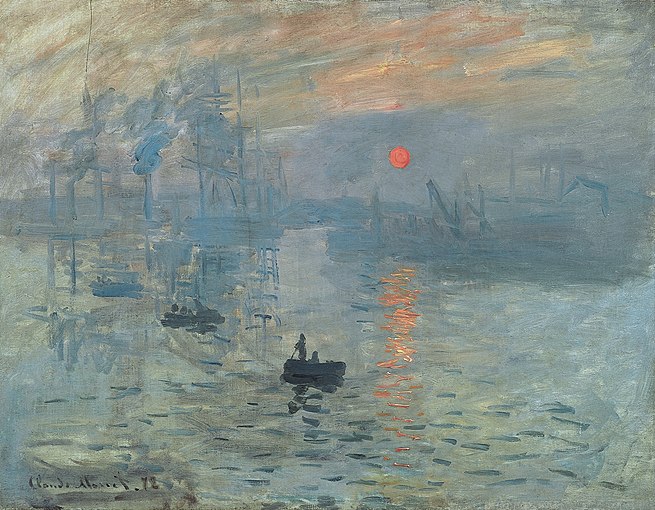
Main Difference
The main difference between Impressionism and Expressionism is that the Impressionism is a 19th-century art movement and Expressionism is a modernist art movement
-
Impressionism
Impressionism is a 19th-century art movement characterized by relatively small, thin, yet visible brush strokes, open composition, emphasis on accurate depiction of light in its changing qualities (often accentuating the effects of the passage of time), ordinary subject matter, inclusion of movement as a crucial element of human perception and experience, and unusual visual angles. Impressionism originated with a group of Paris-based artists whose independent exhibitions brought them to prominence during the 1870s and 1880s.
The Impressionists faced harsh opposition from the conventional art community in France. The name of the style derives from the title of a Claude Monet work, Impression, soleil levant (Impression, Sunrise), which provoked the critic Louis Leroy to coin the term in a satirical review published in the Parisian newspaper Le Charivari.
The development of Impressionism in the visual arts was soon followed by analogous styles in other media that became known as impressionist music and impressionist literature.
-
Expressionism
Expressionism is a modernist movement, initially in poetry and painting, originating in Germany at the beginning of the 20th century. Its typical trait is to present the world solely from a subjective perspective, distorting it radically for emotional effect in order to evoke moods or ideas. Expressionist artists have sought to express the meaning of emotional experience rather than physical reality.Expressionism developed as an avant-garde style before the First World War. It remained popular during the Weimar Republic, particularly in Berlin. The style extended to a wide range of the arts, including expressionist architecture, painting, literature, theatre, dance, film and music.The term is sometimes suggestive of angst. In a historical sense, much older painters such as Matthias Grünewald and El Greco are sometimes termed expressionist, though the term is applied mainly to 20th-century works. The Expressionist emphasis on individual and subjective perspective has been characterized as a reaction to positivism and other artistic styles such as Naturalism and Impressionism.
-
Impressionism (noun)
a movement in art characterized by visible brush strokes, ordinary subject matters, and an emphasis on light and its changing qualities
-
Impressionism (noun)
a style that avoided traditional harmony, and sought to invoke the impressions of the composer
-
Impressionism (noun)
a style that used imagery and symbolism to portray the poet’s impressions
-
Expressionism (noun)
A movement in the arts in which the artist did not depict objective reality, but rather a subjective expression of their inner experiences
-
Expressionism (noun)
A somewhat analogous genre in early 20th century music
